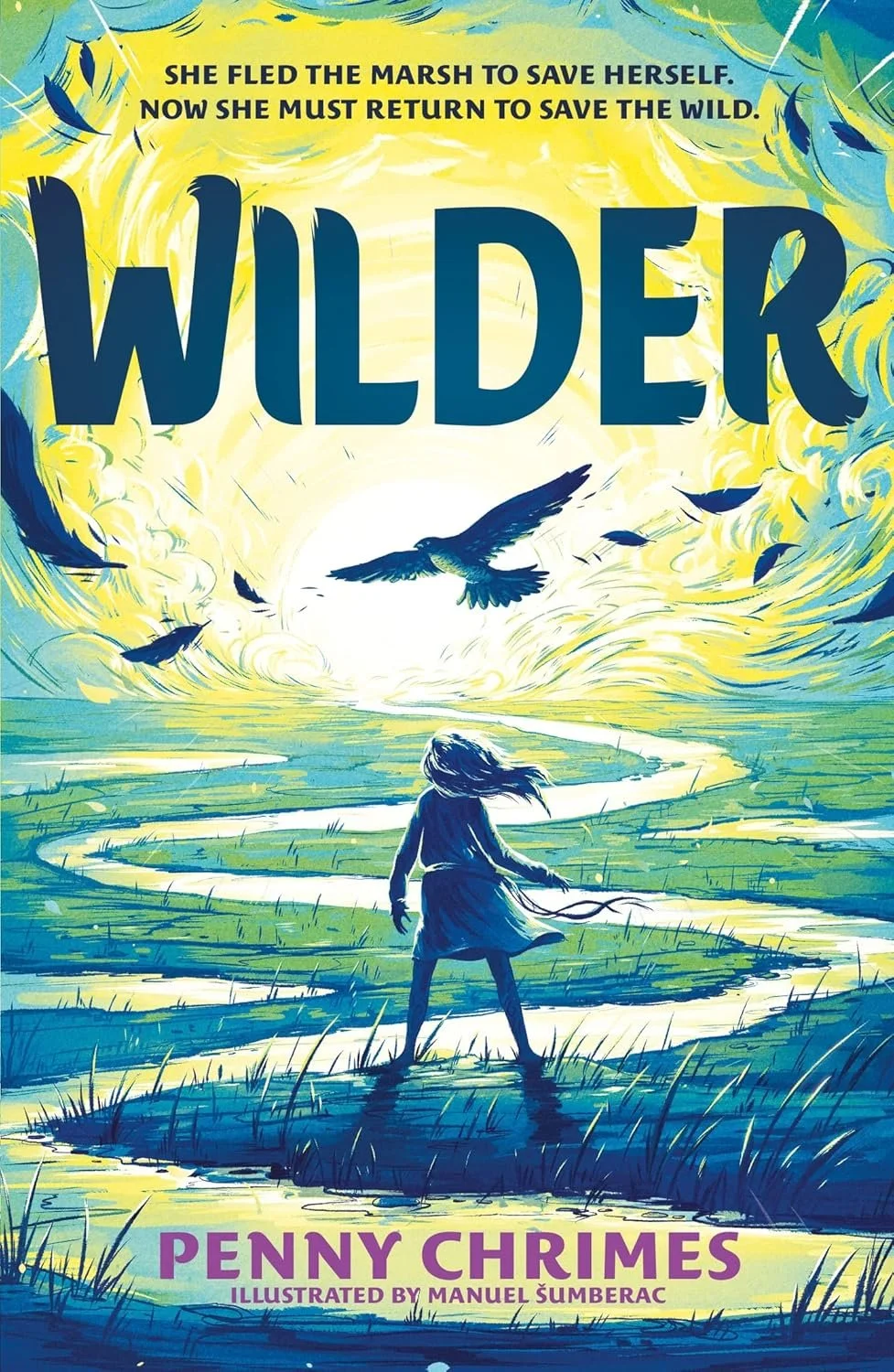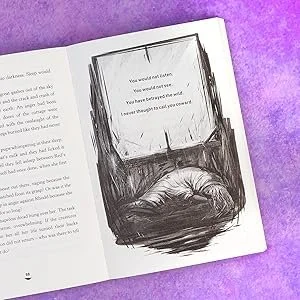Wilder
For ages 9+
I thought this might be an unmissable read... and I was right!! It’s folklore, myth, magic and wildlife heaven.
By Penny Chrimes, illustrated Manuel Šumbrac (Hachette, 2023)
AD - PR
Manuel Šumberac's illustration on the cover artwork really caught my eye when I was deciding what to read next for my February book reviews. The cover (although I only had a digital advanced reading copy) features a palette of vibrant blues, greens and yellows; and a character standing in the countryside by a small waterway, the wind blowing with birds of prey circling ahead. (1) I love a nature story (2) this looked like it could be packed with mystery with a touch of magic (3) I love birds (4) it's Penny Chrimes for goodness sake!
During the first COVID-19 lockdown I set up a YouTube channel called @moonlanetv aiming to transmit children's authors, illustrators and their latest creative works into people's living rooms, classrooms or other shared spaces, through draw-alongs or readings and activities - for free. 'Wilder' author, Penny Chrimes recorded an amazing programme for her book 'The Dragon and Her Boy' in 2021. The impressive level of research that Chrimes’s undertook was reflected in the video as she shared historical anecdote after anecdote together with olde English phrases and words. If you're interested here's the direct link: https://youtu.be/ZqEtWYpPFVI - but first do find out about Chrimes's new enchanting and powerful new middle grade, 'Wilder', because, I just knew instantly that 'Wilder' was going to be an unmissable read... and I was right!!
About the Book
'Wilder' is set in a British water-side village, perhaps 150-200 years ago, telling by the landowning gentry, clothing worn, lack of industry, Christian superstitiousness of traditional ways. The story begins with the discovery of a lonely child appearing one day at the edge of the marsh, merely a toddler when found by the villagers. However, this child is different in appearance to any child they have ever encountered before: her legs scarred and marked with swirling patterns - lashings and stings, she makes sounds in a strange tongue - more like sounds of a wild animal or bird; has a "shock of yellow-white hair" and two huge black eyes with yellow eyelids/rims and dark lashes; and sharp little teeth. Fortunately, she is adopted by the village's local Wise Woman whose own young son, not so long before, had mysteriously disappeared on the marshes. She names the little foundling creature, Rhodd (pronounced Roth).
The reader soon comes to know that Rhodd has a mystical ability to transfer her consciousness into the mind of any living creature, whether a sparrow, a rabbit, an otter, the old dog, or even her friendly falcon. Once she has interpreted the creature’s “mind-shapes”, its language, she can then see through its eyes and feel what it feels. Tremendously useful when escaping the local bullies or the magnanimous villain of a land owner - Lord Stanley.
Rhodd comes to learn that young children have been disappearing once a year on a full moon, into the marsh, never to return. If this isn't tragic a mystery enough, the river has gradually disappeared into the marsh, taking with it all the regular trade at its port, and thus taking the livelihoods of the locals and leaving them terribly poor and struggling to survive. There seems to be an ever increasing pressure on Rhodd from her falcon to return to the marsh, but why, and why does Rhodd fear this going to any length to avoid her fate?
Once a strange sickness starts to sweep through the village, Ma and Rhodd surmise that the enlarged marshland is effecting the health of the natural habitat and in turn making the local human population so unwell, they cannot cure their loved ones, and sadly, deaths start to add up. Most of the villagers have a strong Christian faith mixed with a very strong sense of superstition against the old ways. Rhodd’s Ma, having taken in this strange fledgling-like child, comes up against locals who many fear Rhodd’s true origin and purpose, making their little family and Garr's outcasts and vulnerable. On more than one occasion signs against “witch-evil” are made towards them, a very dangerous time to be accused of being a witch. Did Rhodd's arrival bring about this plague-type event?
'Wilder' is an entrancing story told in two parts. The first being life for Rhodd and her best friend, Gar, in the village - school, outwitting local bullies, the daily struggle to gather food to eat and take care of the wildlife around them, the strain of living on land owned by a tyrannical Lord and the marshland becoming more and more deadly by the day, Rhodd fighting against a familiar but confusing voice in her head. Part two of the story is a pacy and dramatic enactment of Rhodd’s return to her true self, wild and free, at one with nature, as she fulfils her destiny to find the river, the true fate of the children who disappeared, and save the lives of all she knows and loves. There’s a beautiful ending infused with just a touch of pathos.
Reading stories like this, having grown up mostly in England and Scotland, being someone who loves nature and our beautiful landscapes across the UK, I do really feel reconnected to our land and its past inhabitants through the experiences of these earthy characters. It’s really not that long ago that life was balanced on a knife edge in this country, and a slight change in the climate or the ecosystem could mean that a whole community could be wiped out by a failed crop, disease or starvation. I always find the juxtaposition of religion and folklore fascinating and really enjoy reading books where the authors have taken such care to research the social impacts of these clashes in belief systems.
The author has visited one my local nature reserves during the writing process for 'Wilder' - Elmley Nature Reserve - if you ever get the chance to stay there or visit for a day, it’s really awe-inspiring and the bird watching is amazing. Penny Chrimes has an author event there this coming weekend, that if I wasn’t out the country, I’d have loved to have attended myself. Just to add here aswell, I absolutely love the inclusion within the story of real life legendary British Princess, Hafren, daughter of King Locrin, who was drowned in the River Severn in the early 12th century. I hadn’t heard of this character from our past before!
Where this is a story of victory over bullies (child or adult) and the negative impact they have on the environment, this is also the championing of children who are different, who bring with them their own unique gifts and purposes, and sometimes it might cost them their lives. A touching story that achieves the delicate balance between sacrifice, loss, and an appreciation for life entwined in the presence of nature in any given moment.
The special bond between humans and other living creatures is celebrated and revered through Chrimes's storytelling. Manuel Šumberac's illustrations within the story are sympathetic to Rhodd’s character and energy, and the adventures she and Gar go on together. Šumberac, also illustrated the incredible 'Orphans of the Tide' trilogy by Struan Murray that I loved... thus a great pairing with Penny Chrimes for this latest middle grade.
Praise for ‘Wilder’
'This book gripped me like a great hawk in its talons and didn't let me go ... utterly phenomenal' - Zillah Bethell, author of The Shark Caller
Reviewed from uncorrected proof via advance reading copy provided by the publisher.



